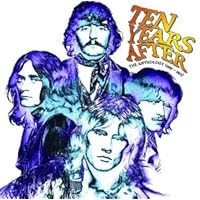
Average Reviews:

(More customer reviews)The tight playlists of Classic Rock radio has shortchanged the legacy of numerous bands, especially those whose reputations were minted in the emerging era of underground FM radio. Today's skyrocketing radio station values have left no time for the extended jams that were TYA's calling card. As such, an entire generation of rock fans knows the band only by their 1971 (air-time-friendly 3'44") hit "I'd Love to Change the World," and the occasional VH1 snippet of their breakout performance at Woodstock. What these fans haven't heard are the riches available on the band's albums, of which there were more than a dozen.
Hip-O's 2-CD collection gathers cuts from eight of the band's original albums (leaving out only 1972's "Rock & Roll Music to the World" and 1974's "Positive Vibrations"), plus a pair of singles and a track from Woodstock, creating a superb overview of the band's original run. This is both a splendid introduction to the band and a well-procured collection of tracks for the TYA fan.
1967's eponymous debut lays out TYA's blues base on four covers, "I Want to Know," Al Cooper's "I Can't Keep From Crying Sometimes," Willie Dixon's "Spoonful," and Sonny Boy Williamson's "Help Me." Even at this early stage Alvin Lee's guitar shows itself to be the incisive instrument that would be showcased in longer jams on later albums.
The 1968 single, "Portable People," is an uncharacteristically genteel A-side for TYA, with a B-side, "The Sounds," that leans heavily towards the psychedelic. Their other non-LP single from the era, "Rock Your Mama" is a straight-ahead blues affair, with a B-side, "Spider in My Web," that takes the sound low and slow. (It's a bit mysterious as to how the seven-plus minute "Spider" was fit onto a 7" 45!).
The live jam "I May Be Wrong, But I Won't Be Wrong Always" from 1968's "Undead" LP gives Lee, keyboardist Chick Churchill, and even bassist Leo Lyons the opportunity to display their chops. The following year's "Stonedhenge" finds the band experimenting with their blues on the psychedelic boogie "Going to Try" and the jazz-tinged organ-and-guitar of "Woman Trouble." Though not their most artistically consistent album, as excerpted here, their experimental directions show some dividends. "Boogie On," recorded during the "Stonedhenge" sessions, was shelved until the 1972 odds 'n' sods release "Alvin Lee and Company," and is featured here in its entire 14-minute glory.
1969's "Ssssh" showed TYA's mastery of the electric twelve bar blues on "I Woke Up This Morning." Recorded shortly before their breakthrough performance at Woodstock (captured on this set by the blistering "I'm Going Home"), "Ssssh" features a seven-minute jam of Sonny Boy Williamson's "Good Morning Little Schoolgirl" (with new, on-the-nose lyrics), and the quieter, down-tempo "If You Should Love Me." Throughout, Lee's intricate guitar playing is a textbook of British electric blues.
The jamming continued on 1970's "Cricklewood Green" with "Love Like a Man" and "50,000 Miles Beneath My Brain." The jazz-based "Me and My Baby" shows the band's improvisational abilities extended outside their signature electric blues-rock. A pair of tracks from 1970's "WATT" finds the band continuing in the same direction with the high-voltage "I'm Coming Home" and the slow-to-boil boogie, "My Baby Left Me."
1971's pop-chart breakthrough, "A Space in Time" featured the band's only major radio hit, "I'd Love to Change the World." True to the single, the album's tracks were shorter, with acoustic playing taking more to the foreground. Still, the band's electric blues roots showed through on the fine "One of These Days," and provided plenty of room for Lee's guitar pyrotechnics.
TYA's blues-soaked rock 'n' roll jams were perfectly attuned to dance halls like the Fillmore, as well as an FM radio industry that was not yet challenged for airtime. Their relentless touring (nine US tours between 1968 and 1979, and twenty-eight by 1975!) made them a popular concert draw and steady record sellers. Hip-O does an superb job of highlighting both their album and live recordings on this double disc set (clocking in at an amazing 156+ minutes!), augmented by a fine essay from Dave Thompson and tightly organized discographical info.
With the length of many of TYA's best tracks, a single-disc anthology (such as "Essential" or "Very Best Ten Years After Album Ever") simply can't cover enough ground to properly explain this band. The only routes deeper than this 2-CD collection are their individual album releases, many of which are now available as remastered imports with bonus cuts. As a starting point, however, you couldn't ask for too much more than these two discs.
Click Here to see more reviews about: Anthology 1967-1971

0 comments:
Post a Comment